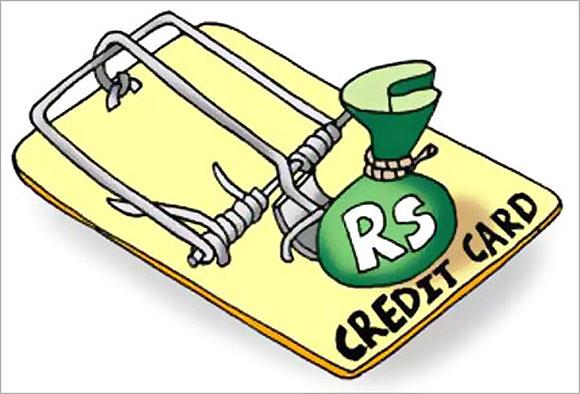In April, Anita Singh, a 50-year-old housewife, purchased a microwave worth Rs 10,100 from a large retailer in Mumbai. The retailer lured her into a six-month easy payment scheme at zero per cent interest rate on her bank's credit card and told that all she was required to pay was an additional processing fee of Rs 500. Even though she had her savings to pay for it, she went ahead with the deal.
A careful look into the scheme now
shows that while the bank converted her payments into six EMIs, she had to pay
the initial two EMIs in the first month. So, effectively, it was six EMIs in
five months and Rs 500 extra on the purchase of a microwave worth Rs 10,100.
A simple calculation shows that the processing fee she paid works out to be
an effective interest rate of 11.9 per cent for her purchase and that too
upfront.
"I feel cheated. I thought I was
being offered the product at zero interest rate but the processing fee is
amounting to this high rate of interest," said Anita, who is a hard
bargainer and always looks to get some extra discount on any product she
purchases.
|
- Often,
what we perceive as economical always has tremendous economics behind it.
Otherwise why would the seller be interested in selling something that
which is fairly cheap to you?
The 0% interest Equated Monthly Instalments (EMIs) was one of the
few attractive schemes which had received strong acceptance, is a case in the
point. Recently, Reserve Bank of India
asked banks to stop 0% interest charging schemes that allowed consumers to buy
goods on equated monthly instalments. Banks used to offer
these special schemes to consumers to buy anything and everything from kitchen
appliances such as induction cookers to even high end electronic gadgets such
as smart phones, tablets and LED television sets.


In financial parlance, you should never borrow to consume and
worse if you are splurging on some electronic gadgets just to catch up with
peers. The basic tenets of financial planning suggest that you should not
borrow to splurge. It can overburden and may limit any scope to borrow for
something essential. However, things are changing and sometimes people prefer
to buy things by borrowing if they increase their efficiency or save their
time. For example, working women want to own a microwave oven and a sales
executive want to own a smart phone. And banks sensed an opportunity in this.
- They
introduced dedicated schemes to sell these products to customers who can
borrow.
- The
only glitch here is that they are wrongly called 0% EMI schemes, where the
consumers get the impression that they are not paying any interest.
- Banks
were making consumers either pay down payments and service charges that
would take care of the interest due on the money paid to product
manufacturers or they were negotiating discounts deals with product
manufactures, wherein the discounts were not passed on to the
customers.
In both cases, RBI feels that customer interests are compromised.
Hence the regulator asked the bank to stop these deals immediately.


What RBI says ...!!
- The RBI has, argued that under the subvention scheme it
is banks' responsibility to make consumers fully aware of the bargain that
they would get from the manufacturer or retailer and also pass on those
benefits fully and indiscriminately.
- "Thus in principle, banks should not resort to any
practice that would distort the interest rate structure of a product as
this vitiates the transparency in pricing mechanism which is very
important for the customer to take informed decision," said the RBI.
- RBI has also instructed banks to put a curb on the
practice where merchant establishments levy fee as a percentage of the
transaction value as charges on customers while they make payments for
purchase through debit cards. "Such fee are not justifiable," said
RBI adding that this calls for termination of relationship of bank with
such establishments.
What do people unhappy with this decision say ?
- Card issuers are also looking to approach the RBI to let
them continue with the subvention schemes as its benefits everyone and
they will on their part make full disclosure to consumers that interest
payment for their purchase is being taken case either by merchant or the
manufacturer.
- "While only 25 per cent of consumer durable
secondary sale is through consumer finance, 75 - 80 per cent of automobile
secondary sale is through consumer finance. Hence, impact is more on
automobiles not durables. Also, consumer durable finance is primarily
through NBFCs, not banks, while automobile finance is routed majorly
through banks," said Deba Ghoshal, marketing head, unitary product
business group, Voltas.
- Naturally, consumer goods companies are
crying foul. They were banking on such schemes to drive their festival
sales and with the RBI notification, cautious customers are likely to be
stay away, they feel.
- According to a report in the Business
Standard, about 20-30 percent of consumer goods sales happen via such zero
percent EMI schemes. Such schemes are usually offered for premium
products. Nilesh Gupta, CEO of Mumbai-based consumer durable goods
retailer Vijay Sales, has been quoted as saying that the size of
transactions will come down by 15-20 percent. Future group CEO has termed
the move as anti-consumption.
What it means for economy ?
- True. It is likely to bring down the sales overall.
- But in the long run it augurs well as consumers take
informed decision.
- Such schemes result in sentiment-driven purchases.
- They inflate demand.
- This is not good in a low-growth, high-inflation scenario,
which is prevalent in India now.
- Moreover, it is important that people know that in an
economy where inflation is high, cash too comes at a higher price.
- This will help restrict demand and in turn control
inflation at least to an extent.
- After all, the interest rate in the economy is trending
upwards.
- Zero interest rate schemes—especially when it is just name
sake—will only distort the real picture.
- The RBI is setting this anomaly right.
It's a move simply to discourage
customers from purchasing consumer goods as RBI wants to decrease CAD and make
inflows of dollars and maintain the foreign reserve. as we all know that all
the electronics and consumer goods are imported to our country and paid in
dollars. In long run it should be beneficial for our economy.
Conclusion !!! (what i feel)
Nothing is free in this world or any other world. Its a welcome
move by RBI to save vulnerable customers(who don't apply their mind). Let the
govt take some hint from this and ban (or atleast put some restriction) such
schemes on retail products. (Like cosmetics companies offering 1 cream free
with another or 10% free like offers, offering conditioners along with
shampoo). Same should be done to all other retail product manufacturers who
hide behind the mask of generosity but in reality lure costumers to buy
unnecessary products.

